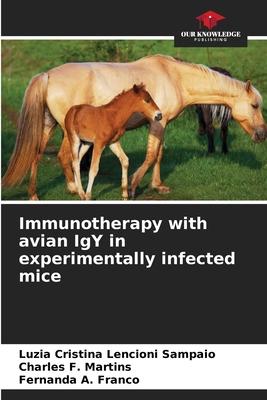Trypanosoma evansi is a flagellated protozoan that affects cattle, sheep, goats, asses, cats and pigs. The disease is particularly important in horses and is known as "chair sickness" due to the characteristic locomotion deficits in infected animals. Various therapeutic drugs have been recommended for prophylaxis and control of the protozoan, but over the years these drugs have lost their efficacy and the protozoan seems to develop resistance. The production and use of avian antibodies has aroused great interest in the scientific community due to the diversity of diagnostic and therapeutic applications. Due to their phylogenetic distance, immune diversification mechanisms and the ability to transfer serum immunoglobulins to egg yolk, a number of advantages are now recognised when using avian antibodies instead of mammalian antibodies. In this study, a specific immunoglobulin against T. evansi was produced by immunising chickens using an isolate of the protozoan. Therapeutic efficacy was tested in Rattus norvegicus.
| FindBook |
有 1 項符合
Immunotherapy with avian IgY in experimentally infected mice的圖書 |
 |
Immunotherapy with avian IgY in experimentally infected mice 作者:Lencioni Sampaio 出版社:Our Knowledge Publishing 出版日期:2024-03-29 語言:英文 規格:平裝 / 52頁 / 22.86 x 15.24 x 0.3 cm / 普通級/ 初版 |
| 圖書館借閱 |
| 國家圖書館 | 全國圖書書目資訊網 | 國立公共資訊圖書館 | 電子書服務平台 | MetaCat 跨館整合查詢 |
| 臺北市立圖書館 | 新北市立圖書館 | 基隆市公共圖書館 | 桃園市立圖書館 | 新竹縣公共圖書館 |
| 苗栗縣立圖書館 | 臺中市立圖書館 | 彰化縣公共圖書館 | 南投縣文化局 | 雲林縣公共圖書館 |
| 嘉義縣圖書館 | 臺南市立圖書館 | 高雄市立圖書館 | 屏東縣公共圖書館 | 宜蘭縣公共圖書館 |
| 花蓮縣文化局 | 臺東縣文化處 |
|
|
圖書介紹 - 資料來源:博客來 評分:
圖書名稱:Immunotherapy with avian IgY in experimentally infected mice
|











